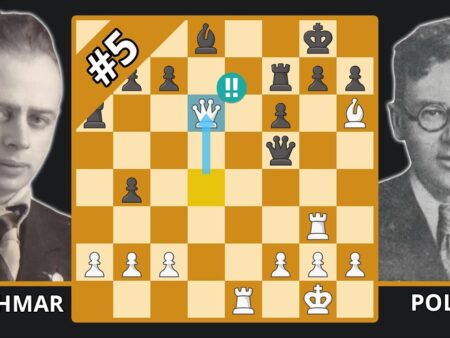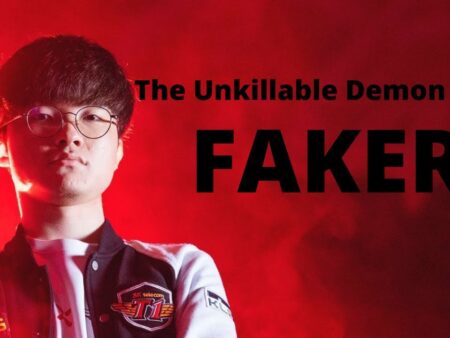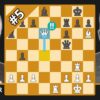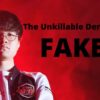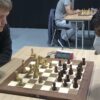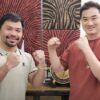FOUR MONTHS before the season unexpectedly descended into chaos, the extended Boston Celtics franchise gathered in a theater to celebrate another championship. Checking in at a small table, I stepped inside the venue, located just blocks from the Brahmin church where Bob Cousy delivered John Havlicek’s eulogy and the four-star hotel that Red Auerbach once called home. For months, I had been immersed in the Boston basketball history that permeates the city, finding no artifacts more profoundly meaningful than the living individuals who witnessed that history and, in some cases, shaped it. This evening’s gathering was a high-level assembly of these witnesses and high priests. An old magic seemed to charge the room. Bill Russell’s daughter, Karen, looked regal in a flowing dress as she chatted with the Boston press corps. Jayson Tatum and Jaylen Brown held court. Jackie MacMullan introduced me to Celtics guard Jrue Holiday. Dan Shaughnessy and his wife mingled near the bar, and 1981 Finals MVP Cedric Maxwell found a small bistro table and settled into a chair. “The connection is family,” Red Auerbach’s youngest daughter, Randy, remarked. “It’s part of our DNA.”
The reason for this snowy Friday evening event was the premiere of Bill Simmons` HBO documentary series, `Celtics City,` which explores Boston`s history through the lens of its basketball team. Sam Cassell, who won a title as a backup guard in 2008 and another last season as an assistant coach, exchanged handshakes with players and staff from different generations.
“This is a lifestyle!” he later exclaimed. “Being a Celtic is a lifestyle!”
The 2024 Larry O’Brien Trophy, gleaming brightly, stood on a pedestal in the center of the party. Nobody present felt too important to savor the moment. Even owner Wyc Grousbeck took a picture. The party commemorated last season’s triumph, even as the current team focused on pursuing a second consecutive title. Tatum embodies the central dilemma of this Celtics era; he must honor the glorious past while remaining fixed on the future. Professional athletes like Tatum aim to forge such a brilliant future that their names might achieve immortality. However, athletes who pursue this dream in Boston find themselves facing a complex opportunity trap. Tradition is a source of vitality, but it also brings burdens. When Bob Cousy retired, Bill Russell famously stated that Cousy`s memory was now their opponent, as formidable as the Lakers, and he meant it sincerely.
When Grousbeck acquired the Celtics in 2002, he found a subculture fractured by Rick Pitino, who had demoted Red Auerbach from team president. One of Grousbeck`s first actions was to board a private jet to D.C., where Auerbach resided, and bring him back as team president. For over two decades, Grousbeck managed the team with a straightforward principle: What would Red do? He guided the team`s future, securing two titles, by drawing lessons from the past. Yet, that era was seemingly concluding this season. His father, 89 years old and a pioneer of private equity, apparently needed to sell the team, Grousbeck`s cherished possession, for estate planning purposes. Uncertainty mingled with celebration as the glory of the previous season transitioned into the quest for the current one. The shifting landscape was palpable as the first game approached. New owners were expected to arrive. Furthermore, due to the NBA`s new collective bargaining agreement, designed to prevent dynasties, the clock was running out on the current team, which had reached two Finals and won one. In the theater foyer, Grousbeck spotted an older gentleman standing near the trophy and approached to pay his respects. It was Mal Graham, a retired state judge who, in an earlier life, had won two titles with the Celtics.
“Last back-to-back,” someone standing nearby whispered to me. This came as a surprise. The Celtics, whose very mythology is built on the concept of an eternal dynasty, have not won consecutive titles since 1969, Bill Russell’s final season. Nine different teams have achieved repeat championships since the Celtics last went back-to-back 56 years ago: the Lakers, the Pistons, the Bulls (twice, including two three-peats), the Rockets, the Lakers (with a three-peat), then the Lakers again with two, followed by the Heat, and finally the Warriors. Winning multiple consecutive titles is central to the Celtics` identity, but Larry Bird and Kevin McHale attempted and failed. Jo Jo White and John Havlicek attempted and failed. Kevin Garnett and Paul Pierce attempted and failed.
The 2024-25 season was intended to be Jayson Tatum’s opportunity.
The Last Two Legends
ONLY TWO MEN remain.
Bob Cousy, 96, and Satch Sanders, 86, are the surviving members of a once-great civilization—the founding fathers of the Celtics’ culture. They are not the only two living teammates of Russell (two-time champion Bailey Howell, 88, still lives in Mississippi), but they hold a more significant status in Boston: the kings of the dynasty, the ones with the rings. Cousy with six. Sanders with eight. John Havlicek, Tommy Heinsohn, and K.C. Jones also had eight (K.C. added two as a coach in the 1980s). Sam Jones had 10. And, of course, Russell won 11. Their numbers hang from the rafters. Their photographs grace every old-time Boston bar. Their presence is a tangible force in the TD Garden and around the team. Fans still wear their jerseys. They are regularly invoked. Their names are like liturgy.
“Luckily, we still have Satch and Bob,” Brad Stevens, the Celtics’ president of basketball operations, told me.
“Cooz,” Randy Auerbach calls him.
“Every time Bob Cousy calls, I jump,” said longtime Celtics PR man Jeff Twiss.
“I literally tried to think what would Red do, what would Bob do, what would Bill Russell do,” Grousbeck stated last year.
“I knew John Havlicek as well as I knew anybody,” commented Joe Kennedy, RFK’s son and JFK’s nephew, when we discussed the Celtics for this story.
“I worked with Satch at the NBA,” shared Chris Havlicek. “Mr. Cousy I’ve known since the day I was born.”
Cousy typically only leaves his home for his regular Thursday night cocktail and pizza party at his country club. “I have my two Beefeaters on the rocks,” he chuckled.
He and Sanders speak about once a month.
“Satch is going through difficult times,” Cousy said with affection in his voice. “His wife has been in hospice for over a month, month and a half now. Ginnie is about to leave us. I haven’t spoken to him in a few weeks. I remind him not to look over his shoulder. We’re the only two freaking guys left!”
Mostly, as might be expected, they joke about death. Gallows humor. Cousy references the big basketball court in the sky. The death watch is respectfully quiet but ever present. In Marcus Thompson II’s 2021 book about the NBA’s greatest dynasties, he shrewdly noted the coming wave of state funerals. “What was evident then,” he wrote, “was how the grains of sand in their hourglasses were dwindling.”
“You’re not going anywhere,” Satch told his friend last year. “You’re only 95.”
“But I’m in a wheelchair now,” Cousy replied.
“Cooz, that happens.”
Meeting Satch Sanders
SATCH SANDERS MET me in the lobby of his retirement community, where he mentioned he is the only Black man among 300 residents, and the only former Boston Celtic. The staff treat him with great care. We passed a billiards table as he led me to his apartment.
“My wife just died two months ago,” he shared.
“I’m really sorry, sir,” I responded.
He smiled wistfully.
“We all fall into that group,” he said, “particularly in a place like this.”
When a resident passes away, their photograph is hung in a room down the hall with blue walls. There had been four new photos added this week alone. “The guys always joke about a picture in the blue room,” he said. “The women take it a little more seriously. We were here five years. That’s a long run. I know some people who are just moving in, and I find myself wondering, how long will they last?”
He led me down a long corridor, we turned right and continued walking until we reached his door. African masks adorned the wall. His wife had felt it was important for them to bring things they loved when they downsized their lives. She had hung a sign that read, `Two old crabs live here.`
“Time to take that down,” he said.
He hadn`t attended his wife’s funeral. Nor had he attended Bill Russell’s funeral. “Funerals are always…” he trailed off. Years ago, he stopped going. He is a man whose life has been described by people he’s never met, so a eulogy holds little meaning for him. He doesn`t wish to hear well-meaning individuals say his friend is in a better place or that his wife looked wonderful in her open casket.
“She looked better when she was alive,” he stated.
“Being alive is important,” he emphasized.
“Being dead… is… gone.”
“It’s being gone.”
His apartment was filled with light. He raised the blinds to view the cottages outside. Gin, his wife, used to say the small houses looked like postcards in the winter when snow dusted their gables. A framed piece of the old Garden parquet floor hung on the wall. His wife’s medical records lay on the table in a precarious stack of paperwork—little use now. A red 3-pound weight and a black 5-pound weight were beside his chair.
“Just kick some pillows out of the way,” he told me, shrugging. These were his craft projects. He made pillows for people.
“Something to do, you know?” he said, laughing softly at himself.
I inquired about the recent losses within his basketball family. “I don’t answer calls when people start out with, ‘Did you know?’… ‘Did you know’ is always going to be followed by, ‘He died.’”
He sighed twice. “Did any of the deaths really affect you differently?” I asked. “Chamberlain,” he answered quickly. “We always saw him as being so big and so strong.”
“What about Bill Russell?” Sanders shook his head. “Russell was human,” he said.
The Weight of the Present
AFTER SPENDING almost a year observing the Celtics’ attempt to repeat as champions, I flew to Boston for what could potentially be the final days of a once-promising year. There are seasons that build upon something, seasons that hold onto something, and seasons where something slips away. This year, the Celtics experienced all three simultaneously, and now the end loomed. In the previous week, they had squandered three double-digit leads (20, 20, and 14 points) to fall behind 1-3 against the surging Knicks. In the closing minutes of the last of those losses, Jayson Tatum had suffered a terrifying injury to his right Achilles. The season and the quest for a repeat, though technically still possible, felt almost secondary as Boston awaited Tatum’s medical report. Sitting on the plane, I exchanged texts with Karen Russell, Bill’s daughter, whom I had first met at the HBO party. We made small talk about how she enjoys visiting K.C. Jones’ daughter in Atlanta so they can savor authentic southern soul food.
We discussed Tatum’s injury. If it was an Achilles, he would likely miss the entire next season. Karen and her brother had attended a baseball game that night with family friend Lenny Wilkens and didn’t hear the news until they returned home. Karen, who has a somewhat maternal nature, tried not to worry excessively until a diagnosis was officially announced. “I’m struggling not to be worried,” she confessed.
Uncertainty cast a melancholy blue over the franchise. How long would Tatum be sidelined? Would he ever regain his previous form? When would the team’s sale be finalized? New owners would naturally want to shape the team. And because of the collective bargaining agreement, a clock had been ticking for a year on the current squad. It felt somewhat like a doomsday countdown, and when Tatum fell to the floor in Madison Square Garden, the minute hand seemed to hurtle towards midnight. Simultaneously, with Cousy at 96 and Sanders at 86, the connection between the uncertain present and the glorious past had never felt thinner or more vulnerable.
The Scoreboard`s Silent Witness
The next morning, with eight long hours until Game 5, I went to see a relic—one-fourth of an old Boston scoreboard, saved from destruction by a Celtics season-ticket holder and successful businessman named Ted Tye. It was the scoreboard that hung in the Garden during Bill Russell’s final two championships—the last back-to-back titles. After the Garden was torn down, the scoreboard remained for years in a suburban mall food court, blending into the background amidst the greasy pizza slices and value meals. When that mall was eventually demolished, a foreman overseeing the wrecking crew called Tye in a panic.
“We’re about to destroy the scoreboard,” he said.
“Just stop,” Tye instructed him.
Tye collected old pieces of Boston memorabilia, so he arranged for the scoreboard to be dismantled, loaded onto a flatbed truck, and moved to an empty warehouse he controlled. It sat there for years, stripped of its extensive, outdated electrical circuitry, a mere shell. Finally, he installed one section of the sign in a new building on the site of the old Boston Herald offices, visible to cars from the adjacent elevated freeway. The original lightbulbs no longer functioned, so Tye replaced them with new electronic panels that display the month, date, and time: May 14, 11:29 a.m. This scoreboard, first installed in 1967, was overhead the last time Tye ever saw his father alive. It was 1989, at a Celtics game at the Garden; watching the new HBO series, Tye saw a familiar face and paused the screen to find himself sitting with his late father directly behind Red Auerbach. The Celtics are woven into many aspects of his life, and like most people I encountered in the city, Tye wanted to discuss Tatum, lamenting the potential of a star and the team he led.
“That’s a tough injury,” he told me. “You don’t know if Brad Stevens is gonna break it all up now.”
The Banner Raising
ON OCT. 22, 2024, the Boston Celtics presented the players with championship rings and raised the franchise’s 18th banner. It was the first game of the season, unseasonably hot in the city. Cirrus clouds and haze blurred the blue sky. Bob Cousy arrived several hours early in a car provided by the team. VIP guests waited in a tent in the parking lot, where the governor of Massachusetts, who wore Cousy’s No. 14 from junior high through college, told him how proud she and the state were of him. The arena filled with people. The VIP tent emptied. Cousy waited in the tunnel in a wheelchair. Celtics PR veteran Jeff Twiss wheeled him out when the event staffer gave the signal. Cousy looked up at him.
“Don’t f— this up,” he instructed.
Former champions emerged onto the court, one by one. Each was announced like a member of royalty.
“Six-time NBA champion, No. 14, Bob Cousy!”
Twiss navigated Cousy to center court, through a long line of fans and dignitaries, and Bob waved to the crowd. He is the only living player to have witnessed the raising of both the first and the most recent Celtics banners. Shaughnessy wrote in the following morning’s Globe: “Cousy played with John Havlicek, who played with Cedric Maxwell, who played with Kevin McHale, who played with Rick Fox, who played with Antoine Walker, who played with Paul Pierce, who played with Avery Bradley, who played with Jaylen Brown.”
Cedric Maxwell followed Cousy, representing two of the three titles in the 1980s, then three members of the 2008 team, the most recent champions, “No. 20” Ray Allen and “No. 5” Kevin Garnett and “with the 2024 Larry O’Brien Trophy, The Truth, No. 34, Paul Pierce!”
Pierce spun the trophy for everyone to see. KG thumped his chest and hid behind dark sunglasses. They gathered as Adam Silver presented the rings. Jaylen Brown rested his left arm on Bob Cousy’s wheelchair. Jayson Tatum stood on Cousy’s other side, an arm around Ray Allen. Silver announced that the title placed the Celtics back ahead of the Lakers as the winningest franchise in league history, 18 to 17, prompting KG to clap loudly enough for Silver’s microphone to pick it up.
“Eighteen banners,” Silver declared, looking up, then over at Bob, before continuing. “And of course, six of those rings belong to Bob Cousy!”
The crowd roared “COOZ,” a deep basso sound that might be mistaken for boos by the unfamiliar. The ceremony concluded, and Twiss wheeled Cousy back beneath the arena. He slipped into a waiting car, heading home to watch the game.
The world outside the arena seemed foreign to him as the car moved through the streets. Where had the old Boston Garden been? Was it here? A block away? Cousy gazed out the window, leaving the cheering crowd behind. “I’ve had my moment in the sun,” he said.
Satch`s Perspective on Aging
SATCH WAS RECOUNTING a story about Cousy and the future King of England. A few years prior, Prince William and Kate visited Boston and planned to attend a Celtics game. The team wanted to show these guests the utmost respect. They wanted Bob Cousy to travel the 47 miles from his house to the Garden.
Cousy called Satch. “Are you going?” he asked. “I’m not going,” Satch replied. “Well, I’m not going either,” Cousy stated. The team intervened and pressured Sanders. “You’re the youngest of the two,” they said. “So I went,” he told me. “Did Cooz go?” Satch laughed. “No, he didn’t go.”
Satch attended and spoke with the royals, who seemed most impressed by his size 18 shoes. “Mah GAWD!” he exclaimed in his best British accent.
He shifted in his seat, moving slowly. I asked him what aging felt like. He smiled in a way that unsettled me. “How old are you?” he inquired. “Forty-eight,” I replied. “What do you wish someone had told you at 48?”
“Just being real about this is the best you’re gonna be,” he said. “Things aren’t getting better. You are deteriorating slowly but surely. The hope is you’re gonna be around for a fair amount of time and feel pretty good, but the odds are against it. You’re probably gonna suffer with the things older people suffer with. Legs aren’t what they used to be. Sleepless nights. Friends and people dying.”
He was born in 1938. His father in 1905. “Understand that it’s a diminishing returns situation. You’re not gonna get better like fine wine. People like to use those old sayings.” His maternal grandfather was born in 1870. “Getting older is losing… being less than.” His maternal great-grandfather, James, was born enslaved without a last name in 1830. “Less than you were,” he said. “You know?”
Many pictures adorned the wall, including one he cherishes with Wilt about to posterize him, in the very act of posterizing him. There was another showing him in a Magic Johnson-like strut, dappled and confident, bringing the ball up court. His eyes seemed to search for teammates, most likely Russell, and Sanders had a smile on his face. “What of that guy still exists?” I asked. He walked over to examine it. His knees crackled like a bowl of Rice Krispies. A small grin crossed his face as he remembered. “That guy,” he said with a laugh.
The photo hung near their tall wooden elephant statues and a cat figurine his wife adored. The first thing he noticed was how happy he looked in the picture. He laughed again because his dribbling wasn`t how the team`s offense was designed. “Auerbach is probably on the side crying the blues,” he remarked. In the photo, he wore a thigh brace, Willie Smith was refereeing, and the player defending him looked like Wayne Hightower, he thought. “But anyway, I know Auerbach is wishing I’d give up the ball.” Sanders looked back at me. “I could handle the ball,” he insisted.
Soon, he would be moving out of this place and into a smaller apartment. “It’s less expensive,” he explained. There was a long pause. “And, um,” he said after another pause. “If I stay here, I’m thinking about her all the time.”
Every month, he wrote a column for the community newsletter, called “Satch’s Corner.” They were quite funny. Writing was his main hobby now, along with making pillows and watching the Celtics on television. All his old neighbors brought their grandkids and great-grandkids to meet the complex`s only celebrity. “You’re that basketball player,” they would say, and as he told me this, he pointed at the photograph hanging on the opposite wall. Nobody wanted to know the 86-year-old man standing before them. They wanted to know the guy on the wall.
Brotherhood of the Dynasty
BILL RUSSELL AND K.C. Jones were college roommates and remained close friends. Satch Sanders learned that Cousy would curse you out in French if you missed one of his passes. Tommy Heinsohn discovered that Cousy often woke in the middle of the night from chronic nightmares, shooting out of bed screaming. A few of them, including Cousy, pilfered matchbooks with the presidential seal while visiting the White House. Kennedy rushed to greet them upon hearing his hometown team was in the building, and one by one, the players said goodbye. Satch Sanders grew nervous and, upon reaching the president, suddenly flustered, blurted out, “Take it easy, baby.” Kennedy roared with laughter, as did the Celtics, and they would tease Satch about it for the rest of his life.
They played gin rummy or hearts on the back of turboprop planes, usually Russell, Heinsohn, and Cousy. On a goodwill tour behind the Iron Curtain, the entire team persuaded two Polish coaches to dress as secret police, complete with fake badges, and pretend to arrest Heinsohn, who fell for it completely, chain-smoking cigarettes until Cousy and Auerbach burst in laughing.
Russell once entered the locker room wearing a cape. “Here comes Batman!” Cousy quipped.
Few teams have been chronicled as extensively as the ‘50s and ‘60s Celtics. Gary Pomerantz’s book about Cousy and Russell, `The Last Pass,` stands at the pinnacle. Bill Russell authored three different memoirs. These books, and dozens of others by and about those teams, paint a vivid picture of a time, a place, and a brotherhood that endured long after the cheering stopped. They didn’t always like each other, but they loved each other.
Their lives were inextricably linked. Sam Jones dedicated time to convincing Bill Russell’s son, Buddha, to declare Sam his favorite basketball player. Russell delighted in lifting one of Cousy’s daughters high into the air, exclaiming with joy, “Hey, little Cooz!” Sanders frequently lost his contact lenses, and on one occasion, a game paused as ten players crawled across the court searching for the missing lens. Bill Russell, naturally, found it. “Here, Satch,” he announced triumphantly. “Do I have to do everything on this team?”
Heinsohn was the glue that held the team together. He would sit with radio announcer Johnny Most in late-night hotel lobbies, listening to Most’s stories about being a gunner on a B-24 in World War II. Everyone admired Heinsohn. One year, during the Finals, he had a confrontation with Wilt Chamberlain. “Do that one more time and I’ll knock you on your ass,” Wilt growled. Heinsohn stood his ground. “Bring your f***ing lunch,” he replied.
K.C. Jones would sing whenever opportunity arose. Satch could do an excellent Russell impression. Russell faced much teasing for getting his low-slung Lamborghini stuck in the snow. One evening, Cousy and Heinsohn were at the bar of the Beverly Wilshire Hotel with Lauren Bacall. Tall, 5’8” barefoot, she wore perfume that smelled of roses and blackcurrants. Bob had his gym bag with him. Lauren snatched it, triumphantly pulled out a jockstrap, and hurled it across the bar at him. He dodged the smelly projectile and threw it back.
On the road, due to his seniority and star status, Cousy had a large suite to himself. Hotel rooms became his entire world. Meanwhile, Heinsohn enjoyed painting watercolors from his hotel window. This was a team of interesting, distinct men. Russell loved to read; the book that affected him most was a biography of the complex Haitian revolutionary leader Henri Christophe, who built a fort to defend Black people from their enslavers. The fort still stands, a rare monument in the Western Hemisphere built by a Black man. That fact, and especially that phrase, resonated deeply with Russell: A Black man.
Cousy also devoured books—histories, novels, memoirs. Theodore H. White’s `The Making of the President 1960` and `To Kill a Mockingbird.` Harper Lee’s work moved him profoundly. Sometimes, Heinsohn could persuade Bob to join him for a beer or two. Like Russell, Cousy was a complex, private man with deep emotional scars from his impoverished and violent upbringing. He would murmur to himself all night in French, his subconscious never at peace. Russell wrote: “In later years, as the pressure built up, Cousy went through the torture that only a superstar can really know. The lot of the superstar is—lonely nights, horrible hotel rooms, and nightmares. There is the story Cousy tells about his nightmares and sleepwalking that got so bad he eventually had to tie himself to his bed. Cousy’s nightmares were so terrifying he once got out of bed stark naked and wound up dashing himself against trees as he ran from his frightening dream—and this was offseason.”
Russell and Cousy: A Complex Duo
EVERYTHING on the court revolved around Russell. Most NBA players caught in a defensive trap shout, “Help.” Russell’s Celtics yelled, “RUSS!” Every offensive play began with an entry pass to Russ. Yet outside the team, much of the credit went to the flashy, famous Cousy.
Reporters and fans centered Celtic victories around Cousy—Cousy’s genius, Cousy’s talent, Cousy’s leadership. For years, the press tried to provoke him into saying something critical about Russell. He always refused. To much of the public, a white star in Boston was the center of the solar system, with the Black star revolving around him. Reporters wrote glowingly about Cousy, crowding him in the locker room, and this hurt Russell.
He never forgot how in college, after leading his team to one of two national titles during a 55-game winning streak, a white player was named the Most Valuable Player in Northern California. Forty years later, you could still provoke a reaction by simply mentioning the name Ken Sears. Thus, he resented how Cousy was lionized, even as he recognized what a great player Cousy was. Russell wrote: “I would get things like this: You’ve blocked fourteen shots, scored twenty-three points and grabbed thirty-one rebounds against somebody like Chamberlain and the Celtics are now one up in the Eastern finals and you come out of the dressing room door and someone says: ‘Let me shake your hand. I’ve just shaken the hand of the greatest basketball player in the world, Bob Cousy. Now, I want to shake the hand of the second greatest.’”
The first season Russell played without Cousy, the Celtics’ attendance dropped by 1,500 fans per game.
As teammates, the two men discussed basketball extensively but little else. Cousy would read the news and see everything Russell said about racism in Boston and America, but he wouldn’t bring it up with him. “He went his way and I went mine,” Russell wrote. Pomerantz noted that Bob Cousy was simply too preoccupied with being Bob Cousy to take on the burden of Russell’s experiences with American racism. If Russell didn’t know how to engage in anything deeper than a surface-level conversation with Cousy, Cousy likewise didn’t know how to go deep. Both would later admit to being terribly lonely. They spent thousands of days side by side yet never truly understood each other.
Pomerantz compared them to Babe Ruth and Lou Gehrig. “The problem was,” he remarked, “they both really wanted to be Ruth.”
Cousy`s Emotional Farewell
THE END as a player arrived for Cousy in 1963. The team hosted Bob Cousy Day on St. Patrick’s Day—or perhaps St. Cousy Day on Bob Patrick Day; one can imagine how this blend of myths resonated in the Irish neighborhoods south of the Garden. Cousy went to the stadium alone that day, via a passageway from his hotel to the Garden. As the hotel door locked behind him, he discovered the arena door was also locked, and he pounded on it for a few minutes. A member of the cleaning crew asked who was knocking so forcefully. “One of the players,” Cousy replied.
A stereo microphone descended on a long black cord from the rafters. A heavy wooden lectern, a temporary pulpit, appeared. The Garden staff set up chairs on the court for the Cousy family—one for his wife, Missie, and one each for his mom and dad. The daughters stood, as did Bob. Owner Walter Brown presented him with a sterling silver tea set and a 1963 steel gray Cadillac. Red Auerbach read a letter from John F. Kennedy in which the president asserted that as long as basketball was played anywhere, the rhythmic movement of the ball between teammates would serve as a memorial to Bob Cousy. Auerbach hugged him, and a fragile dam within Cousy broke. He began to sob, burying his head in Red’s shoulder. The team’s founder and owner, Walter Brown, spoke next.
He spoke of how the franchise was just five years old when Cousy arrived. “Things always weren’t so good with the Celtics,” he said. “One year, things were so bad I couldn’t pay them their playoff money. Bob never said a word.” Brown stated that Cousy’s commitment was the reason a Boston Celtics team existed at all. He seemed to be urging the fans never to forget: there was no money, and he had already mortgaged his house and even sold some furniture. Cousy’s grace, and the grace of his teammates, kept them solvent. It bestowed upon the future everything to come, from Russell to Bird to Tatum.
Cousy spoke last, spreading his notes on the podium. His wife and two daughters joined him at center court. The girls held bouquets of flowers. Cousy fought back tears before he even began. He looked up at the crowd, which sat in silence. He sniffled into the microphone. “Mere words seem so inadequate in order to say the things,” he began, his voice cracking, and he stopped, looking down. His daughter also wiped her eyes. It felt like a Viking funeral. The crowd applauded as Cousy struggled to regain composure. “I hope you’ll bear with me,” he said.
The mayor and the governor sent gifts. Cousy thanked all of them, and then his teammates’ wives for their kindnesses to his family. His daughter handed him a tissue. He said he knew he would miss the brotherhood that vanishes the moment an athlete leaves a team. He broke down. A pregnant, emotional silence hung in the Garden. “WE LOVE YA, COOZ!” a fan shouted.
His younger daughter wiped her eyes. His mom, wearing a mink stole, also wiped her eyes. Bob’s voice cracked again. He finally finished. He didn’t name his teammates. He didn’t speak of Russell. He hugged his mother, then his wife, then his two girls, and blew a kiss to the crowd. The organist played the familiar opening bars of `Auld Lang Syne,` and the Garden erupted in pandemonium. People rose through the haze of cigarette smoke, leaning over the loge decks. They surged with emotion. The applause seemed to intensify, shifting gears. No one remained seated. They cheered for two minutes and six seconds.
Russell`s Tribute to Cousy
The team gathered later at the Lenox Hotel on Boylston Street. Russell stood to speak, loosening his tie. “If Bob Cousy were this much less a man,” he said, holding his enormous hands an inch apart, “I would have resented him.”
“I didn’t want to come tonight,” he admitted. He paused, and everyone leaned in, knowing Bill Russell always spoke the truth. “I’m too big a man to cry,” he declared. Cousy was stunned. “We see each other as brothers,” Russell continued. “You meet a Cousy not once in a month, but once in a lifetime.” He looked over at Cousy, feeling the weight of what might have been if they had been closer friends. Both of them felt it. Their wives, Missie and Rose, cried in each other’s arms.
Russell bowed his head and walked away.
Later in private, he presented Cousy with a gift he had personally selected at a jewelry shop established in 1796, located directly across from Paul Revere’s silver store. It was a desk clock with bronze hour and minute hands, engraved on the back: “May The Next Seventy Be As Pleasant As The Last Seven. From The Russells To The Cousys.” Bob and Missie placed the gift on a mahogany table in their dining room, where it remains today. He had sold most of his memorabilia—rings, an autographed picture from President Kennedy, and a basketball marking his 5,000th assist. Almost everything. “But not that clock,” Pomerantz confirmed.
Jayson Tatum and the Road to Greatness
“FOUR, THREE, TWO, one,” a coach counted during practice as Jayson Tatum navigated a double team at the end of a possession, quarter, or game. He missed. The coach retrieved the ball, and the drill continued. “Seven, six, five.”
Tatum was the last player remaining on the court at the Auerbach Center. He was striving to be the greatest ever, which is often the path to an unhappy life. Cousy had nightmares. Russell stared at hotel walls until he felt himself going crazy. Bird remains a recluse. Tatum was nearly alone in the Auerbach Center, moving from wing to wing, shooting jump shots, making and missing, driving for a layup. “Twelve, 11, 10,” the coach counted.
Tatum dribbled at the elbow, fluidly floating backward for a fadeaway jump shot that clanked off the back of the rim. The energy that coalesced in the Garden on Bob Cousy Night still exists as scattered particles, eager to merge once more. Each carries a strand of mitochondrial information, awaiting the summoning blast of a horn. Bob and Russ. Heinsohn. Hondo. Satch Sanders. Sam and K.C. Jones. They built the road Jayson Tatum now travels, moving along familiar milestones. First, like Cousy and Russell, he has arrived at a peaceful realization, where scales fall from his eyes, and he understands what he means to this place, to this city and the people who call it home. That is a beautiful moment in the life of every Celtic great, and he is experiencing it now.
But there is a second, more profound truth awaiting a select few, it seems. Not so much out there as… in here. The true life’s work for any Celtics great is to attempt to comprehend what they meant to each other, and what they could have meant, to a teammate, to a rival. Traveling the path to greatness demands such selfless focus that the traveler might only realize too late that the ultimate purpose of the journey was the people with whom he traveled—fellow supplicants, pilgrims, following the path laid by Cousy and Russ.
Tatum moved along the three-point line, shaded left at the top of the key, and bricked it again. Driving down the right baseline, he made a fadeaway. He has won one title and is competing for another. Living intensely in the present takes its toll. One day, Bob Cousy and I were discussing championship rings and winning 11 titles in 13 years. Even now, he fixates on the ones that eluded them. “It should have been 12,” he said. Bill Russell, he recounted, injured his ankle in the 1958 Finals, and they lost without him. That was 67 years ago, and yet it felt like yesterday. Jayson Tatum’s sneakers echoed in the gym. He finished the drill and moved to the free-throw line. Jaylen Brown, the older players say, is more inclined to study the past. He is the only current Celtic who has made an effort to get to know Satch Sanders. Tatum is busy trying to be Jayson Tatum.
Swish.
Swish.
Miss.
Russell 11. Sam Jones 10. Havlicek 8. Sanders 8. Cousy 6. Bird 3. Tatum 1.
Swish. Swish. Swish. Swish. Swish. Swish. Swish. Swish.
He settled himself. Received the ball. Dribbled, feeling the leather on his hand, then his fingertips. Bill Russell lived for 88 years. For 75 of those years, he was not a Boston Celtic. These careers last only a moment. Tatum exhaled.
Swish.
Russell`s Tribe and Trauma
RUSSELL PLAYED SIX seasons after Cousy retired, and during those years, he thought frequently about tribes. He discussed them constantly, as that was how he viewed the world—small groups of people with their own customs, rules, and rituals. It was his fundamental code and his perspective. Russell famously stated he didn’t play for Boston; he played for the Celtics. He saw his team as a sacred assembly of people—a vehicle for exploration and a safe harbor. They were not merely sportsmen and entertainers; they were warrior kings. Yes, Russ was Black, Red was Jewish, Cousy was the son of immigrants, and Ramsey was a son of the South, but they all belonged to a tribe more powerful than the ones into which they were born. They had, in essence, been reborn. They were Celtics.
Bill’s father, Charles Russell, loved to share phrases and mantras. A tribe, he would say, should be proud but never arrogant, powerful but never destructive. “You must acknowledge and accept other tribes,” he told his son, “And never say, ‘My tribe can do this, so they’re better than yours.’”
Russell struggled mentally and emotionally in those first seasons without Cousy. Medgar Evers was killed. John F. Kennedy was killed. Three civil rights workers were killed in Philadelphia, Mississippi. Russell spent significant time staring at walls, right “on the verge of a nervous breakdown,” he has recounted several times.
Russell described basketball as “the loneliest life in the world. A world of bright lights and screaming emotion and vast amounts of money—and deep wells of loneliness. So deep. Such an abyss. You fall far into it and all your life struggle to come back up.”
Boston never truly felt like home. But the Celtics did, and the team earned him his place in the lineage of proud patriarchs in his family. His grandfather Jake ran the Ku Klux Klan off his land, firing a shotgun as they scattered. His other grandfather used his own money to build the first school in his area for Black children. When a gas station attendant once called his father “boy” and threatened to kill him, Charles Russell chased the man with a tire iron. As an old man, Bill Russell would recall that moment and swell with pride. His inheritance was a fierce rhetorical and spiritual armor.
Russell drove south the year after Cousy retired, passing through the Jim Crow states with his children to visit family. His son, Jacob, named after his grandfather, repeatedly asked to stop for food. In the boy’s usual world, his father was one of the most famous men in the country. But in the South, he was simply Black. It broke something inside Russell to keep gripping the steering wheel as his son asked, “Daddy, can’t we stop? Daddy, I’m hungry?”
Season after season, he led his team to victory after victory, taking over as head coach when Auerbach stepped down. Russell was the first Black head coach in any of the four major American sports; the Celtics drafted the first Black player in NBA history, hired the first Black coach, and started the first all-Black lineup.
Russell read, studied, and fought for the causes he believed in. Martin Luther King met with Russell as he prepared for his `I Have a Dream` speech. King invited him to sit on the stage for the speech itself, but Russell felt he didn’t belong there and watched from the crowd. He ran a basketball camp in Mississippi in Evers’ name after the civil rights advocate was murdered. He supported John Carlos, Tommie Smith, and Muhammad Ali. Playing in Boston, he later said, was a traumatic experience. People vandalized his house numerous times. His future neighbors in the suburb of Reading openly opposed his moving in and circulated a petition. Rose Russell cried upon hearing about it. “They don’t want us here,” she said.
Not long after winning the third of his 11 titles, a man walked up to Russell while he sat at a red light behind the wheel of his new Lincoln. “Hey, nigger,” the man shouted. “How many crap games did it take you to win that car?”
For 13 seasons, he felt claustrophobic. “As we got to know each other better, I think the thing that I was most curious about was how he handled all of the pressure,” his widow Jeannine Russell shared. “He was carrying the weight of the whole city, his team, the black community, and his own expectations on his shoulders.”
Finally, after the 1969 season, following two consecutive titles, Russell retired. He drove alone in his Lamborghini to California, accelerating across the flat expanse of the American West, heading back towards home—his old one in Oakland and his new one on Mercer Island in Seattle.
Decades passed. The Celtics legends began passing away. Red Auerbach’s daughters, living on opposite coasts, divided the funeral duties: Randy would handle West Coast burials, and Nancy the East Coast ones. Their father cherished these men, who remained young in the memories he held. “The phone would ring and he would just light up,” Randy Auerbach recalled.
Auerbach held weekly lunches at a Chinese restaurant in D.C. and played tennis frequently with Sam Jones, who lived nearby. But in 2006, his health declined rapidly. Russell flew to D.C. to say goodbye. Red sat in his favorite chair. They spoke warmly about the past. “What happened to that sports car you had?” Red asked, still teasing him about the Lamborghini. “We are driving a nice, slow minivan,” Russell replied. “It’s come to that?” Auerbach said with a laugh.
Not long after, Red Auerbach died. His daughters personally called only two former Celtics players to deliver the news: Bill Russell and Bob Cousy.
